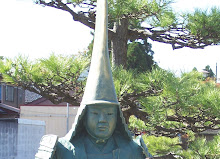Author John Haffner, who just wrote a book on the Japanese global reality called Japan's Open Future: An Agenda for Global Citizenship recently wrote an essay for the Huffington Post. He sets the stage for us:
“Japan's population is dropping, but the country is not so keen on immigrants to counter the decline.”
Quite true. Japan is apparently keen on being a very empty country in the future. He continues:
“Looking beyond its borders, some of Japan's leaders have felt nostalgic for the simple rules of the Cold War.”
Yep. How nice it was! The U.S. worried about defeating the Soviet Union and communist China, while the Japan self defense force did push ups, and Japanese businesses focused on making the most efficient compact car in the world. We resume:
"Japan's political leadership, meanwhile -- already long seen as mediocre or incompetent by the Japanese public - has lost all credibility, both at home and abroad. In a recent article describing Japan's (now resigned) trade minister Shoichi Nakagawa at a G7 press conference as 'incoherent, floundering, sleepy and confused.'"
Yes indeed. Think what happens when you give your adolescent son too much money, too little responsibility and then, you suddenly ask him to grow up. What happens? He becomes "incoherent, floundering, sleepy and confused." You might call it a Japan United States codependency issue (which the U.S. has been happy to nourish, for sure).
“So where should Japan go from here?...And when it comes to Japan's triangulations with the United States and China, should Japan simply hope to 'hug the US closer,'or should it cultivate a stance neither too hot nor too cold towards the United States and China, like Goldilocks?”
I don’t have a clue really, though somehow will need to check Chinese power in Asia. Can the Japanese help the U.S. with such a project? In twenty years will Japan have enough young men to form a Japanese defense force of any merit? Japan’s plunging birth rate keeps getting in the way of future plans.
For the author, the solution to Japanese cultural and political problems is to become a lot less like Japan, and more like England.
“If Japan wishes to escape a future of decline and irrelevance, and if it wants to take meaningful steps towards a more secure, contented and prosperous future, it needs to think big. Japan really has only one sustainable option: to become a more open, dynamic, conscientious, engaged, globally integrated country.”
Okay…but this doesn’t sound like anything Japan has ever been. I have a great fondness for Japan and Japanese culture, but this sounds more like America than Japan. The author proposes how Japan can move forward (or at least beyond Japanese history):
“Moving beyond a rigid and inflexible conception of its national identity, by opening up to trade and immigration, by learning to communicate more effectively, including with the English language as the global lingua franca, and by undertaking a much more spirited commitment to global development and security.”
It’s idealistic, I’ll say that. Let’s go point by point on this critique of Japanese culture:
- An inflexible national identity: Huh? This is fine progressive talk for a pluralistic society, but in Japan? How are the Japanese supposed to become less Japanese? No one seems to be asking the Chinese to become more flexible in their Chinese national identity?
- Immigration: I think Japan would benefit from measured immigration (more doctors and other heath care folks, for instance), but it’s not an easy question. Japan is Japan because it’s homogeneous. In England, for example, immigration from Muslim countries is profoundly changing that culture. Now you can argue whether that’s good or bad, but that’s a big step.
- English: I suspect that many readers of this blog are English teachers in Japan and have a lot of ideas about the state of English in Japan. What do you all think?
- Global Security: I think if Japan wants to have a “spirited commitment” to the world, they better send combat soldiers to Afghanistan and start fighting terrorists with NATO. And if China ever invades Taiwan, Japanese Chinese relations should sour and a Japanese United States alliance may have to combat China. I wonder if that’s what the author means, or is he talking about a resurgence in Japanese patriotism?
Our Author concludes:
“To pursue this path, however, Japan must think beyond isolationism and the US security alliance. Japan must begin to see itself as a global citizen and as an Asian country, and it must walk the walk on both counts.”
On this last point I’m in total agreement with the author. Japan will actually have to do more than send tourists out into the world if it wants to be a leading world citizen.
You can purchase Mr. Haffner's book at Amazon.com:








3 comments:
Dear Mr. Kato,
Thank you very much for your interest in my Huffington Post opinion piece and my book Japan's Open Future. Along with my co-authors, I hope to generate exactly this kind of debate and discussion among people interested in the future of Japan and Asia.
I will be organizing an Internet-based forum discussion in a couple of months to discuss some major themes from the book. I will be sure to let you (and your readers) know when and where: I hope you will be able to join us!
Best wishes,
John Haffner
Dear Mr. Haffner,
Thanks for your comments; please keep us informed and thanks for checking in on the discussion.
"Japan's population is dropping, but the country is not so keen on immigrants to counter the decline.”
The best defense of Nihon is the language. As a gaijin I hope the Japanese demand the potential immigrants master at least 1946 Kanji pictograms in addition to mastering the spoken language.
acc
Post a Comment